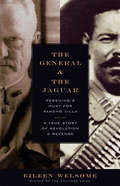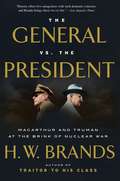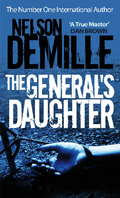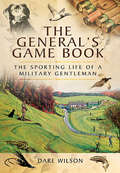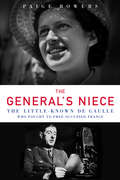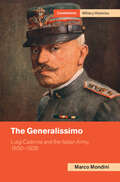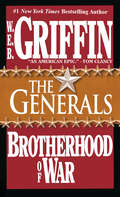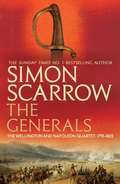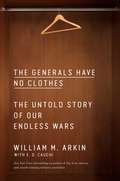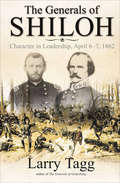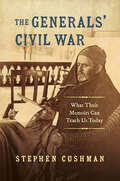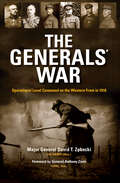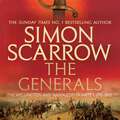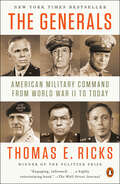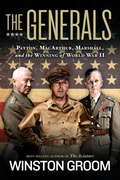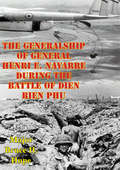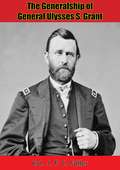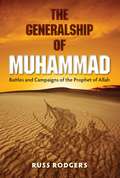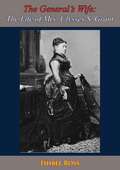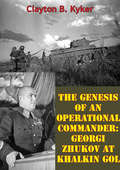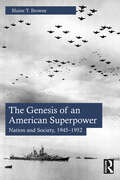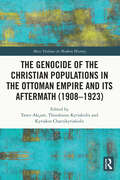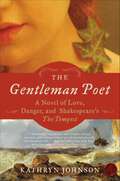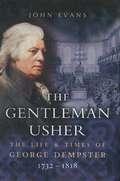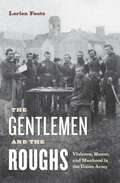- Table View
- List View
The General and the Jaguar: A True Story of Revolution and Revenge
by Eileen WelsomeOn the cold, dark night of March 9, 1916, Mexican revolutionary Pancho Villa--el jaguar--and his band of marauders crossed the border and raided the tiny town of Columbus, New Mexico. It was a vicious surprise attack, ending with corpses piled in the streets and psychological wounds that would last a lifetime. Suspects were rounded up, trials were held, and a virulent backlash against persons of Mexican origin erupted. General John "Black Jack" Pershing was told to assemble a small army, head into Mexico, and get Villa, dead or alive. The last hurrah for the U.S. cavalry, the "Punitive Expedition" marked America's first use of armored tanks, airplanes, and trucks against an enemy. One of the deputies Pershing would choose was a recent West Point graduate named George Patton. The expedition brought the United States and Mexico to the brink of war, but it also restored greatness to both prey and predator. More than a classic account of the war for control of the West, The General and the Jaguar is a brilliant chronicle of obsession and revenge and a dual portrait of Pershing and Pancho Villa, two of the greatest military minds of all time.
The General vs. the President: MacArthur and Truman at the Brink of Nuclear War
by H. W. BrandsFrom master storyteller and historian H. W. Brands comes the riveting story of how President Harry Truman and General Douglas MacArthur squared off to decide America's future in the aftermath of World War II. At the height of the Korean War, President Harry S. Truman committed a gaffe that sent shock waves around the world. When asked by a reporter about the possible use of atomic weapons in response to China's entry into the war, Truman replied testily, "The military commander in the field will have charge of the use of the weapons, as he always has." This suggested that General Douglas MacArthur, the willful, fearless, and highly decorated commander of the American and U.N. forces, had his finger on the nuclear trigger. A correction quickly followed, but the damage was done; two visions for America's path forward were clearly in opposition, and one man would have to make way. Truman was one of the most unpopular presidents in American history. Heir to a struggling economy, a ruined Europe, and increasing tension with the Soviet Union, on no issue was the path ahead clear and easy. General MacArthur, by contrast, was incredibly popular, as untouchable as any officer has ever been in America. The lessons he drew from World War II were absolute: appeasement leads to disaster and a showdown with the communists was inevitable--the sooner the better. In the nuclear era, when the Soviets, too, had the bomb, the specter of a catastrophic third World War lurked menacingly close on the horizon. The contest of wills between these two titanic characters unfolds against the turbulent backdrop of a faraway war and terrors conjured at home by Joseph McCarthy. From the drama of Stalin's blockade of West Berlin to the daring landing of MacArthur's forces at Inchon to the shocking entrance of China into the war, The General and the President vividly evokes the making of a new American era.From the Hardcover edition.
The General's Daughter (Paul Brenner)
by Nelson DeMilleHer murder was just the beginning. She was an army captain and the daughter of legendary General 'Fighting Joe' Campbell, when her body was found - naked and bound - on the firing range of Fort Hadley. This political powder keg of a case goes directly to elite army investigator Paul Brenner and rape specialist Cynthia Sunhill - and explodes.Behind the military code of honour, Brenner and Sunhill uncover trails of corruption - all leading to the golden girl's shocking secret life.
The General's Game Book: The Sporting Life of a Military Gentleman
by Major General Dare WilsonDare Wilson's sporting career dates back to 1920s when, as a small boy, he started fishing in Northumberland on River Derwent. Since then as he has pursued successful careers in the Army and Conservation, he has fished and shot all over the world; turkey hunting and snake catching in Georgia, pheasants in Korea, sand grouse and quail in Palestine, geese in Ireland, ducks in Manitoba.A natural story teller, General Wilson's sporting career almost ended while wildfowling in The Wash in early 1939 he, his Cambridge University friends and their dogs were saved by a miracle. An uninterrupted line of black Labradors have shared Dare's experiences. The current one, is the 12th. For good measure the General tells of his thrilling winter sports (skiing and cresta) and parachuting experiences. His team of SAS free-fallers broke the World Record in 1962 tragically one member died.Dare may have lived life on the edge but the risks he has taken have always been carefully calculated. Had they not been he would not still be an active fisherman and shot in his 90's. This is a treasure trove of sporting stories.
The General's Niece: The Little-Known de Gaulle Who Fought to Free Occupied France
by Paige Bowers"My dear Uncle Charles," twenty-two-year-old Geneviève de Gaulle wrote on May 6, 1943. "Maybe you have already heard about the different events affecting the family." The general's brother Pierre had been taken by the Gestapo; his brother Xavier, Geneviève's father, had escaped to Switzerland. Geneviève asked her uncle where she could be most useful—France? England? A French territory? When no response came immediately, she decided to stay in France to help carry out his call to resist the Nazis.Based on interviews with family members, former associates, prominent historians, and never-before-seen papers written by Geneviève de Gaulle, The General's Niece is the first English-language biography of Charles de Gaulle's niece, confidante, and daughter figure, Geneviève, to whom the legendary French general and president dedicated his war memoirs.Journalist Paige Bowers leads readers through the remarkable life of this young woman who risked death to become one of the most devoted foot soldiers of the French resistance. Beginning with small acts of defiance such as tearing down swastikas and pro-Vichy posters, she eventually ferried arms and false letters of transit to fellow résistants and edited and distributed the nation's largest underground newspaper, until she was arrested and sent to the infamous Ravensbrück concentration camp. The General's Niece reveals the horrors the young de Gaulle witnessed and endured there that could have broken her spirit but instead inspired her many remaining years of activism on behalf of former prisoners and of France's neediest citizens.Finally emerging from the shadow of her famous uncle, the life of this little-known de Gaulle adds a fascinating layer to the history of the second world war, including the French resistance, the horrors of and unshakeable bonds formed at Ravensbrück, and the issues facing postwar France and its leaders.
The Generalissimo: Luigi Cadorna and the Italian Army, 1850–1928 (Cambridge Military Histories)
by Marco MondiniLuigi Cadorna remains one of the most controversial generals in Italian history. Appointed chief of the armed forces in 1914, he led the Italian army in the field from May 1915 until the aftermath of their calamitous defeat at Caporetto in 1917. In this major new biography, Marco Mondini traces Cadorna's rise, the nature of his command, the course of the Isonzo campaign, and the battles over his post-war reputation. He brings a new cultural perspective to Cadorna's life, demonstrating the role of Italy's military and national culture, the myths of the Risorgimento, and the mobilization of propaganda in creating an effective cult of personality. Utilizing ego-documents, memoirs, letters and public writings, Mondini delves into the ideology and psychology that combined to create such an untouchable autocrat, arguing that the history of fascism in Italy cannot be fully understood without appreciating Cadorna's role in the First World War.
The Generals (Brotherhood of War #6)
by W.E.B. GriffinThey were the leaders, the men who made the decisions that changed the outcome of battles...and the fate of continents. From the awesome landing at Normandy to the tortorous campaigns of the South Pacific, from the frozen hills of Korea to the devastated wastes of Dien Bien Phu, they had earned their stars. Now they led America's finest against her most relentless enemy deep in the jungles of Southeast Asia. It was a new kind of war, but the Generals led a new kind of army, ready for battle--and for glory...
The Generals (Wellington and Napoleon 2)
by Simon ScarrowTHE GENERALS is the compelling second novel in Simon Scarrow's bestselling Wellington and Napoleon quartet. A must read for fans of Bernard Cornwell.In the turbulent aftermath of the French Revolution Napoleon Bonaparte stands accused of treachery and corruption. His reputation is saved by his skill in leading his men to victory in Italy and Egypt. But then he must restore order in France and find peace or victory over her enemies: England - and Arthur Wellesley (the future Duke of Wellington).Wellesley is leading a vast army in India, where British interests are under threat. The campaign will result in the creation of the Raj - the jewel in the British Empire's crown. Wellesley returns to England a hardened veteran and more determined than ever to end France's domination of Europe.Both Wellesley and Napoleon intend to win - whatever the cost. Who will ultimately succeed?
The Generals Have No Clothes: The Untold Story of Our Endless Wars
by William M. ArkinThe definitive book about America&’s perpetual wars and how to end them from bestselling author, military expert, and award-winning journalist William M. Arkin.The first rule of perpetual war is to never stop, a fact which former NBC News analyst William M. Arkin knows better than anyone, having served in the Army and having covered all of America&’s wars over the past three decades. He has spent his career investigating how the military throws around the word &“war&” to justify everything, from physical combat to today&’s globe-straddling cyber and intelligence network. In The Generals Have No Clothes, Arkin traces how we got where we are—bombing ten countries, killing terrorists in dozens more—all without Congressional approval or public knowledge. Starting after the 9/11 attacks, the government put forth a singular idea that perpetual war was the only way to keep the American people safe. Arkin explains why President Obama failed to achieve his national security goal of ending war in Iraq and reducing our military engagements, and shows how President Trump has been frustrated in his attempts to end conflict in Afghanistan and Syria. He also reveals how COVID-19 is a watershed moment for the military, where the country&’s civilian and public health needs clash with the demands of future wars against China and Russia, North Korea and Iran. Proposing bold solutions, Arkin calls for a new era of civilian control over the military. He also calls for a Global Security Index (GSX), the security equivalent to the Dow Jones Industrial Average, which would measure the national and international events in real time to determine whether perpetual war is actually making the nation safer. Arguing that the American people should be empowered by facts rather than spurred by fear, The Generals Have No Clothes outlines how we can take control of the military…before it&’s too late.
The Generals of Shiloh: Character in Leadership, April 6–7, 1862
by Larry TaggThe author of The Generals of Gettysburg examines the characters and actions of the military leadership at this Tennessee Civil War battle. “Character is destiny,” wrote the Greek philosopher Heraclitus more than twenty-five centuries ago. Most writers of military history stress strategy and tactics at the expense of the character of their subjects. Larry Tagg remedies that oversight with The Generals of Shiloh, a unique and invaluable study of the high-ranking combat officers whose conduct in April 1862 helped determine the success or failure of their respective armies, the fate of the war in the Western Theater, and, in turn, the fate of the American union. Tagg presents detailed background information on each of his subjects, coupled with a thorough account of each man’s actions on the field of Shiloh and, if he survived that battle, his fate thereafter. Many of the great names are found here in this early battle, from Ulysses S. Grant, William T. Sherman, and Don Carlos Buell to Albert S. Johnston, Braxton Bragg, and P. G. T. Beauregard. Many more men, whose names crossed the stage of furious combat only to disappear in the smoke on the far side, also populate these pages. Each acted in his own unique fashion. This marriage of character (“the features and attributes of a man”) with his war record offers new insights into how and why a particular soldier acted a certain way, in a certain situation, at a certain time. Nineteenth century combat was an unforgiving cauldron. In that hot fire some grew timid and listless, others demonstrated a tendency toward rashness, and the balance rose to the occasion and did their duty as they understood it. This book explores all of their individual stories. “Does a good job of shining a bright light upon the great preponderance of highly placed citizen-generals in the Shiloh armies.” —Civil War Books and Authors
The Generals' Civil War: What Their Memoirs Can Teach Us Today (Civil War America)
by Stephen CushmanIn December 1885, under the watchful eye of Mark Twain, the publishing firm of Charles L. Webster and Company released the first volume of the Personal Memoirs of Ulysses S. Grant. With a second volume published in March 1886, Grant's memoirs became a popular sensation. Seeking to capitalize on Grant's success and interest in earlier reminiscences by Joseph E. Johnston, William T. Sherman, and Richard Taylor, other Civil War generals such as George B. McClellan and Philip H. Sheridan soon followed suit. Some hewed more closely to Grant's model than others, and their points of similarity and divergence left readers increasingly fascinated with the history and meaning of the nation's great conflict. The writings also dovetailed with a rising desire to see the full sweep of American history chronicled, as its citizens looked to the start of a new century. Professional historians engaged with the memoirs as an important foundation for this work. In this insightful book, Stephen Cushman considers Civil War generals' memoirs as both historical and literary works, revealing how they remain vital to understanding the interaction of memory, imagination, and the writing of American history. Cushman shows how market forces shaped the production of the memoirs and, therefore, memories of the war itself; how audiences have engaged with the works to create ideas of history that fit with time and circumstance; and what these texts tell us about current conflicts over the history and meanings of the Civil War.
The Generals' War: Operational Level Command on the Western Front in 1918 (Twentieth-Century Battles)
by Major General David T. ZabeckiKnown as the War to End all Wars and the Great War, World War I introduced new forms of mass destruction and modern technological warfare. When the Bolsheviks pulled Russia out of the war in late 1917, the Germans turned their offensive efforts to the Western Front in an attempt to win the war in 1918. But as fresh American troops entered Europe, the strategic scales tipped against Germany.Much of how World War I played out turned on the plans and decisions of the senior-most German and Allied commanders. The Generals' War explores the military strategies of those generals during the last year of the Great War. These six very different men included Germany's Field Marshal Paul von Hindenburg and General Erich Ludendorff; France's Marshals Ferdinand Foch and Philippe Pétain; Great Britain's Field Marshal Sir Douglas Haig; and the United States' General John Pershing. Although history remembers none of them as great captains, these six officers determined for better or worse how World War I was fought on the battlefields of the Western Front between November 1917 and November 1918.The Generals' War is a landmark exploration of the generalship that shaped the very framework of modern warfare as we know it today and provides a comprehensive and detailed analysis on the senior commanders of the Great War.
The Generals: (Revolution 2) (Revolution #2)
by Simon ScarrowTHE GENERALS is the compelling second novel in Simon Scarrow's bestselling Wellington and Napoleon quartet. A must read for fans of Robert Harris.In the turbulent aftermath of the French Revolution Napoleon Bonaparte stands accused of treachery and corruption. His reputation is saved by his skill in leading his men to victory in Italy and Egypt. But then he must restore order in France and find peace or victory over her enemies: England - and Arthur Wellesley (the future Duke of Wellington).Wellesley is leading a vast army in India, where British interests are under threat. The campaign will result in the creation of the Raj - the jewel in the British Empire's crown. Wellesley returns to England a hardened veteran and more determined than ever to end France's domination of Europe.Both Wellesley and Napoleon intend to win - whatever the cost. Who will ultimately succeed?
The Generals: American Military Command from World War II to Today
by Thomas E. RicksFrom the #1 bestselling author of Fiasco and The Gamble, an epic history of the decline of American military leadership from World War II to IraqHistory has been kind to the American generals of World War II--Marshall, Eisenhower, Patton, and Bradley--and less kind to the generals of the wars that followed. In The Generals, Thomas E. Ricks sets out to explain why that is. In part it is the story of a widening gulf between performance and accountability. During the Second World War, scores of American generals were relieved of command simply for not being good enough. Today, as one American colonel said bitterly during the Iraq War, "As matters stand now, a private who loses a rifle suffers far greater consequences than a general who loses a war."In The Generals we meet great leaders and suspect ones, generals who rose to the occasion and those who failed themselves and their soldiers. Marshall and Eisenhower cast long shadows over this story, as does the less familiar Marine General O. P. Smith, whose fighting retreat from the Chinese onslaught into Korea in the winter of 1950 snatched a kind of victory from the jaws of annihilation.But Korea also showed the first signs of an army leadership culture that neither punished mediocrity nor particularly rewarded daring. In the Vietnam War, the problem grew worse until, finally, American military leadership bottomed out. The My Lai massacre, Ricks shows us, is the emblematic event of this dark chapter of our history. In the wake of Vietnam a battle for the soul of the U.S. Army was waged with impressive success. It became a transformed institution, reinvigorated from the bottom up. But if the body was highly toned, its head still suffered from familiar problems, resulting in tactically savvy but strategically obtuse leadership that would win battles but end wars badly from the first Iraq War of 1990 through to the present.Ricks has made a close study of America's military leaders for three decades, and in his hands this story resounds with larger meaning: about the transmission of values, about strategic thinking, and about the difference between an organization that learns and one that fails.
The Generals: Patton, MacArthur, Marshall, and the Winning of World War II
by Winston GroomCelebrated historian Winston Groom tells the story of three remarkable men-at-arms who rose from the gruesome hell of the First World War to become the finest generals of their generation during World War II. George Marshall, George Patton, and Douglas MacArthur redefined America's ideas of military leadership and brought forth a new generation of American soldier. Their efforts revealed to the world the grit and determination that would become synonymous with America in the post-war years.
The Generalship Of General Henri E. Navarre During The Battle Of Dien Bien Phu
by Major Bruce H. HupeThis study examines the generalship of the French Commander-in-Chief in Indochina, General Henri E. Navarre, during the battle of Dien Bien Phu in 1954. This thesis employs a model of generalship from the United States Army doctrinal publication, Field Manual 22-103, Leadership and Command at Senior Levels, to analyse the actions of General Navarre. Through the application of the model, this thesis tests whether American doctrine supports or refutes the judgment of history. The conclusion reached is that the defeat of the French forces at the battle of Dien Bien Phu was largely due to a failure of senior level leadership on the part of General Henri E. Navarre.
The Generalship of General Ulysses S. Grant
by Maj.-Gen. J. F. C. Fuller“THE greatest event in European history was the discovery of the New World: today it could only be rivalled by landing on a habitable planet. The greatest event in American history was the Civil War; greater than the Rebellion, because separation from England was sooner or later inevitable. The man who most greatly influenced this war was Ulysses S. Grant; not because he was so clear-sighted a statesman as Lincoln, or so clever a tactician as Lee, but because he was the greatest strategist of his age, of the war, and, consequently, its greatest general.Grant was not of the type of Alexander, Cæsar, Frederick and Napoleon: he was a simple-minded man of vision, and one who for nearly forty years remained an obscure citizen of the Great Republic. It is for this reason that I have dedicated my book on his generalship to the Youth of America; for I believe that the second greatest event in American history was the recent World War, which, cracking the Old World to its foundations, left the United States standing like a granite rock.In writing this book my object has been to examine what Grant accomplished as a soldier; to show that as such he has not been fully appreciated, and that as he looked upon war as a necessary evil so long as peace remains imperfect, we also, after the greatest war in modern times, may find in his honesty and in his vision our direction towards creating a happier and less turbulent world. “Let us have peace,” he said: well then—let us examine war.”—J. F. C. Fuller, Preface
The Generalship of Muhammad: Battles and Campaigns of the Prophet of Allah
by Russ RodgersThere are many biographies of the Prophet, and they tend to fall into three categories: pious works that emphasize the virtues of the early Islamic community, general works for non-Muslim or non-specialist readers, and source-critical works that grapple with historiographical problems inherent in early Islamic history. In The Generalship of Muhammad, Russ Rodgers charts a new path by merging original sources with the latest in military theory to examine Muhammad's military strengths and weaknesses.Incorporating military, political, and economic analyses, Rodgers focuses on Muhammad’s use of insurgency warfare in seventh-century Arabia to gain control of key cities such as Medina. Seeking to understand the operational aspects of these world-changing battles, he provides battlefield maps and explores the supply and logistic problems that would have plagued any military leader at the time.Rodgers explains how Muhammad organized his forces and gradually built his movement against sporadic resistance from his foes. He draws from the hadith literature to shed new light on the nature of the campaigns. He examines the Prophet's intelligence network and the employment of what would today be called special operations forces. And he considers the possibility that Muhammad received outside support to build and maintain his movement as a means to interdict trade routes between the Byzantine Empire and the Sasanid Persians.
The General’s Wife: The Life of Mrs. Ulysses S. Grant
by Ishbel RossAn excellent and diligently researched biography of Julia Boggs Dent Grant (1826-1902), the wife of the 18th President of the United States, Ulysses S. Grant, and First Lady of the United States from 1869 to 1877. An active participant in presidential matters, The First Lady was widely regarded to possess tremendous strength of character, sharing in the mixed fortunes of her husband, promoting his welfare, loved and cared for her family, and fulfilled her patriotic duty as First Lady. She reveled in her role as hostess to the nation, and by all accounts brought warmth and a home-like atmosphere to the White House.Includes over 15 B&W illustrations.
The Genesis Of An Operational Commander: Georgi Zhukov At Khalkin Gol
by Clayton B. KykerThe Red Army's defeat of the Germans during the Second World War is one of the great achievements in military history. The military man most responsible for that victory was Marshal Georgi Zhukov. Though less well known than some of his German or allied counterparts, Zhukov was a brilliant practitioner of a distinctive, and uniquely Soviet, style of operational art. This style was first tested against the Japanese Kwangtung Army at Khalkin Gol in Mongolia. Zhukov's operational scheme at Khalkin Gol was the prototype for his later successes at Moscow, Stalingrad, and Kursk.Zhukov and the Red Army came of age together. Both rose from the ashes of the Tsarist Army and endured two decades of war, debate, reform and crisis. While Zhukov rose through the ranks of the cavalry, the Red Army underwent a period of great intellectual activity. By the mid 1930's, Soviet military theorists began to explore new concepts of successive or "deep" operations that promised to avoid the positional warfare of World War One. During this period, Zhukov became an avowed "tankist" and was extremely well placed to participate in this "renaissance."When Stalin launched his purge of the Red Army in 1937, Zhukov was a Corps Commander. Though interrogated at length, he survived. In 1939, Zhukov, then a Deputy Military District Commander, was summoned to Moscow. Zhukov was relieved to find that he had been ordered to proceed to Khalkin Gol in Mongolia where Soviet troops were facing a Japanese incursion across the border.After assessing the situation, Zhukov prepared a plan to drive the Japanese out of Mongolian territory. Upon assuming command and conducting a massive build-up of combat power, Zhukov launched a devastating offensive spearheaded by massed tanks and artillery that would become the prototype for Soviet offensives during the Second World War.
The Genesis of an American Superpower: Nation and Society, 1945–1952
by Blaine T. BrowneThis book is the first comprehensive analysis of a crucial transitional period in American history, when the nation abandoned its previous isolationist tradition and accepted the burdens of global leadership in the aftermath of World War II.American society, culture, economy and politics were all transformed in the postwar era, as an abundant society evolved and confronted crucial issues such as coping with the nuclear age and addressing civil rights. During the presidency of Harry Truman, the United States undertook the reconstruction of Europe, the occupation of Germany and Japan, participated in the judicial prosecution of war criminals and instituted the policies and agencies necessary to confront the expansion of Soviet power as the Cold War took shape. The structure of a modern national security state began to form as the military was reorganized to accommodate the possible use of nuclear weapons and combat newly arisen threats. Alongside analyzing the historical, political and economic developments that led to America’s dramatic transformation, each chapter also sheds light on key figures of the era including Eleanor Roosevelt, Humphrey Bogart and Bayard Rustin.The Genesis of an American Superpower is a unique resource aimed at general readers and undergraduates, graduates and scholars alike interested in modern American history and politics.
The Genocide of the Christian Populations in the Ottoman Empire and its Aftermath (Mass Violence in Modern History)
by Taner Akçam Kyriakos Chatzikyriakidis Theodosios KyriakidisDuring the twilight years of the Ottoman Empire, the ethnic tensions between the minority populations within the empire led to the administration carrying out a systematic destruction of the Armenian people. This not only brought 2,000 years of Armenian civilisation within Anatolia to an end but was accompanied by the mass murder of Syriac and Greek Orthodox Christians. Containing a selection of papers presented at The Genocide of the Christian Populations of the Ottoman Empire and Its Aftermath (1908–1923) international conference, hosted by the Chair for Pontic Studies at the Aristotle University of Thessaloniki, this book draws on unpublished archival material and an innovative historiographical approach to analyze events and their legacy in comparative perspective. In order to understand the historical context of the Ottoman Genocide, it is important to study, apart from the Armenian case, the fate of the Greek and Assyrian peoples, providing a more comprehensive understanding of the complexity of the situation. This volume is primarily a research contribution but should also be valued as a supplementary text that would provide secondary reading for undergraduates and postgraduate students.
The Gentleman Poet: A Novel of Love, Danger, and Shakespeare's The Tempest
by Kathryn Johnson“The Gentleman Poet is the best kind of historical novel—well researched, beautifully written, and wildly entertaining.”—Daniel Stashower, author of The Beautiful Cigar GirlThe Gentleman Poet, author Kathryn Johnson’s novel of love, danger, and Shakespeare’s The Tempest, is a wonderful story that imagines a series of astonishing events that just might have inspired the immortal Bard to pen his magical tale. Told from the point of view of a young servant girl who strikes up a friendship with the not yet famous playwright when they are shipwrecked in the Bermudas, The Gentleman Poet gives a delightful new spin on Shakespearean lore reminiscent of the Academy Award-winning film, Shakespeare in Love.
The Gentleman Usher: The Life & Times of George Dempster 1712-1818
by John EvansGeorge Dempster was a giant of a man who became one of the best-known and most deservedly popular Scotsman of his day.He served for thirty years as an MP in Westminster and was closely involved with the expansion of British influence and trade across the world particularly in India and North America. This was the age of Empire building and great rivalry between competing powers, particularly France, which led to protracted warfare.A trained lawyer, Dempster was at the heart of political and business life and his circle of friends was large and powerful. Yet power did not corrupt him and he was respected by allies and opponents, being known as 'Honest George'. Master of the famous Skibo Estate in Sutherland, Dempster's energy was legendary and he used his talents as an entrepreneur and developer, bringing prosperity and jobs to disadvantaged regions.Dempster was more than an observer of history; he made it.
The Gentlemen and the Roughs: Violence, Honor, and Manhood in the Union Army
by Lorien Foote&“A seminal work&” on class divisions within the Union Army—&“One of the best examples of . . . scholarship on the social history of Civil War soldiers&” (The Journal of Southern History). During the Civil War, the Union army appeared cohesive enough to withstand four years of grueling war against the Confederates and to claim victory in 1865. But fractiousness bubbled below the surface of the North&’s presumably united front. Internal fissures were rife within the Union army: class divisions, regional antagonisms, ideological differences, and conflicting personalities all distracted the army from quelling the Southern rebellion. In this highly original contribution to Civil War and gender history, Lorien Foote reveals that these internal battles were fought against the backdrop of manhood. Clashing ideals of manliness produced myriad conflicts, as when educated, refined, and wealthy officers (&“gentlemen&”) found themselves commanding a hard-drinking group of fighters (&“roughs&”)—a dynamic that often resulted in violence and even death. Based on extensive research into previously ignored primary sources, The Gentlemen and the Roughs uncovers holes in our understanding of the men who fought the Civil War and the society that produced them. Finalist for the 2011 Gilder Lehrman Lincoln Prize
